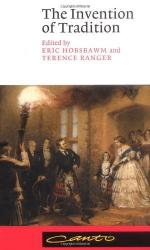
|
| Name: _________________________ | Period: ___________________ |
This quiz consists of 5 multiple choice and 5 short answer questions through Chapter 6, The Invention of Tradition in Colonial Africa.
Multiple Choice Questions
1. According to ______ Morgan, there were a number of groups and individuals who were involved in preservation of Welsh culture.
(a) Bryn.
(b) Brys.
(c) Peter.
(d) Prys.
2. According to the book, _______ of old traditions is one of the causes of the invention of traditions.
(a) Nostalgic remembering.
(b) Falsification.
(c) Loss of meaning.
(d) Destruction.
3. According to the book, much of European invented tradition arose in the last ________ years of the nineteenth century.
(a) Ten.
(b) Seventy-five.
(c) Thirty.
(d) Fifty.
4. There were several ideas for merging the two cultures ritually. One of the experiments had to do with using the anthem "God Save the _____".
(a) Emperor.
(b) Queen.
(c) King.
(d) Empress.
5. According to the book, _______ and transport innovation made accenting grandeur even easier for royal ceremonies.
(a) Location.
(b) Church.
(c) Music.
(d) Phone.
Short Answer Questions
1. The author derides the British media for thinking the rituals are over ______ years old when in fact they are relatively new.
2. Cannadine suggests that the British monarchy went through ______ distinct phases as the ceremonial image of the monarchy developed.
3. According to the book, the notion of a distinct Highland culture is a myth that did not exist prior to the _______ century.
4. The Welsh lineage included all of the following backgrounds with the exception of _______.
5. At the beginning of Chapter Four, the author notes that few heads of state are more popular than _______.
|
This section contains 232 words (approx. 1 page at 300 words per page) |

|




